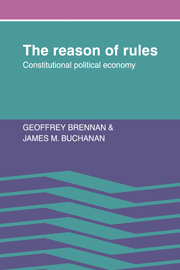Book contents
- Frontmatter
- Contents
- Preface
- 1 The constitutional imperative
- 2 The contractarian vision
- 3 The myth of benevolence
- 4 Modeling the individual for constitutional analysis
- 5 Time temptation, and the constrained future
- 6 Politics without rules, I: Time and nonconstrained collective action
- 7 Rules and justice
- 8 Politics without rules, II: Distributive justice and distributive politics
- 9 Is constitutional revolution possible in democracy?
- Index
9 - Is constitutional revolution possible in democracy?
Published online by Cambridge University Press: 05 November 2011
- Frontmatter
- Contents
- Preface
- 1 The constitutional imperative
- 2 The contractarian vision
- 3 The myth of benevolence
- 4 Modeling the individual for constitutional analysis
- 5 Time temptation, and the constrained future
- 6 Politics without rules, I: Time and nonconstrained collective action
- 7 Rules and justice
- 8 Politics without rules, II: Distributive justice and distributive politics
- 9 Is constitutional revolution possible in democracy?
- Index
Summary
Introduction
This book is an extended essay in persuasion. We have tried to offer logical bases for imposing constraining rules on the political actions of persons, including ourselves, as present or potential actors in political roles. We hope that our arguments for the desirability of accepting a “constitutional attitude” have been convincing, both in the abstract analysis and in the practical applications of this analysis. Widespread acceptance of such an attitude is a prerequisite of genuine constitutional reform. We would, however, be naïve in the extreme if we failed to acknowledge major barriers to the achievement of any shift in the basic rules of political order. This chapter is devoted exclusively to analysis and discussion of these barriers.
It is, we presume, evident that we must answer the question of the chapter's title affirmatively. If we did not, the discourse of this book, and of much of our work elsewhere, would have to have been driven by purely aesthetic purpose. In one sense, we share a moral obligation to hold fast to the faith that persons organized in a polity can reform the rules by which and under which they live. Any other belief, it seems to us, would be a counsel of despair. This faith in the potential for reform must, nonetheless, be distinguished from constructive analysis of the difficulties of escaping the dilemmas we confront.
- Type
- Chapter
- Information
- The Reason of RulesConstitutional Political Economy, pp. 134 - 150Publisher: Cambridge University PressPrint publication year: 1986



